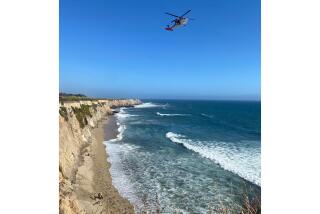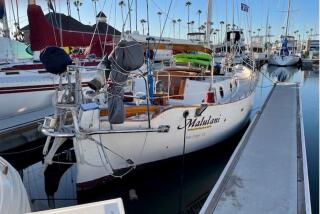It’s Coast Guard to the Rescue of Blind Solo Sailor
In broad daylight Tuesday, Robert Ward pointed his 35-foot sloop toward Hawaii and set sail. He was going solo. It was his first time.
He didn’t make it.
The odds were bad to begin with. Ward is blind.
Legally blind, that is. A seasoned sailor, Ward, 50, of Downey, can see well enough when it’s light out. In the past, Ward has sailed with a crew and has done quite well, Coast Guard Petty Officer 1st Class Dale Arden said.
But apparently, as Ward struck out alone, he failed to account for nightfall. Come darkness, Ward really does become blind.
He radioed for help about 10 p.m. after falling off course, Coast Guard Lt. Wayne Brown said.
“It got dark, and he couldn’t read his compass and chart,” Brown said. “After awhile, he didn’t know where the heck he was.”
The Coast Guard sent a cutter about 80 miles off San Diego, where it spotted the Anna Kristine knocking about in 15-knot winds and 8-foot swells being generated by tropical storm Estelle. Ward was on board and safe.
The Coast Guard isn’t sure where Ward’s common sense went overboard.
“I would say he didn’t seem to be using his best judgment,” Arden said.
Ward told his rescuers that he was unable to crank the halyard winches, making it impossible to bring the main and jib sails into proper trim for the worsening conditions. After starting the boat’s motor, Ward realized he needed his compass and maps. But he couldn’t see them.
Ward’s plight renewed concerns by marine authorities about the loose regulation of recreational boaters. No license is required and no age restrictions are imposed on operators of recreational vessels, said Coast Guard Petty Officer 3rd Class Dawn Hrynda in the duty office.
“Anyone with money can buy and operate a boat,” Hrynda said. “That’s the scary part. Someone who should not be operating a boat goes out, gets in trouble, and we have to rescue them. It happens too often.”
On the other hand, operators of commercial vessels are subject to stringent restrictions, Hrynda said.
In the most general terms, state marine authorities require that recreational navigators “maintain proper watch” to avoid collisions, said Michael Rich, senior officer with the San Diego Harbor Police.
Those terms applied particularly to the wayward Ward, Rich said.
“In order to keep a watch,” Rich said, “you have to be able to see.”
More to Read
Sign up for Essential California
The most important California stories and recommendations in your inbox every morning.
You may occasionally receive promotional content from the Los Angeles Times.










